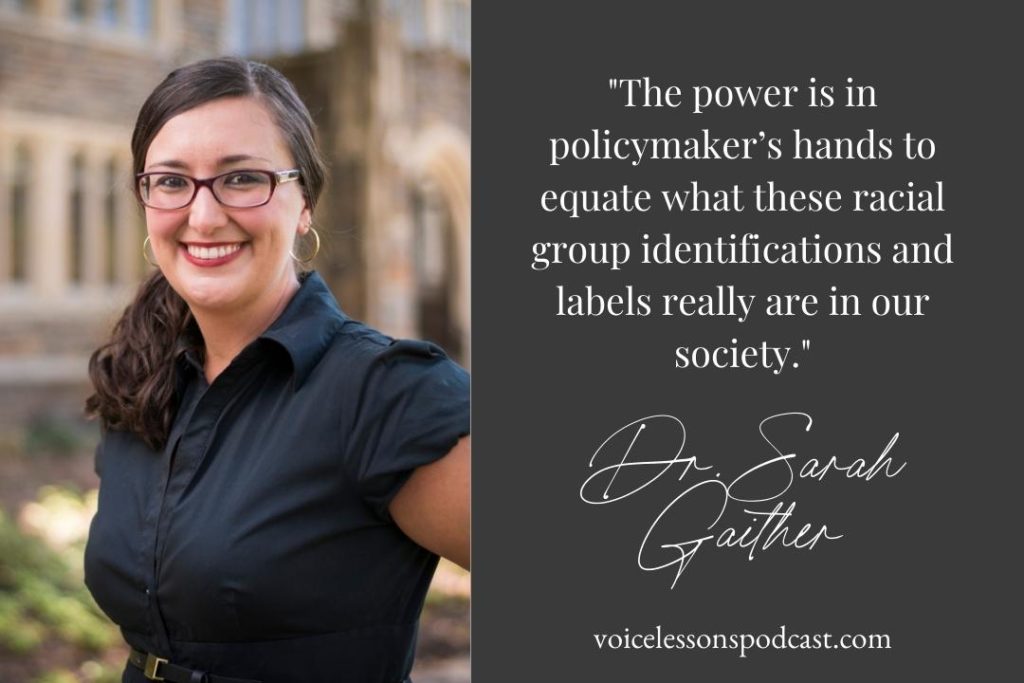| “What are you?” It’s a question Dr. Sarah Gaither was asked a child growing up mixed race. Now she studies the effects of that question and others related to identity at Duke University’s Identity & Diversity Lab. In this episode on belonging, we talk about identity denial, identity accessibility, and why she’s using her own multiracial identity to help create a more inclusive world. |
https://directory.libsyn.com/episode/index/id/23498279

Dr. Gaither is the Assistant Professor of Psychology and Neurology at Duke University and she brings incredible insight around how being biracial effects individuals based on her research, her work and her personal experience. She leads the Duke Identity & Diversity Lab where she and her students work with interracial families to study relationships among various social identities. She has been published in numerous professional publications and also on social platforms like vox.com and the todayshow.com.
Dr. Gaither’s research focuses broadly on how a person’s social identities and experiences across the lifespan motivate their social perceptions and behaviors in diverse settings. More specifically, she studies how contact with diverse others shapes social interactions, how having multiple social identities and malleable social identities affects different types of behavior and categorizations of others, and what contexts shape the development of social perceptions and biases from childhood through adulthood.
TOPICS DISCUSSED:
- Why Sarah starting studying bi-racial identities as a bi-racial person.
- The mixed-racial dynamic in her family structure allowed for them to communicate more openly about racial issues.
- Was privilege part of Sarah’s journey in comparison to her brother who presents more Black?
#LESSONUP
(1:55) “What are you” was something I even study for a living now in my lab as a professor. I was constantly questioned particularly when I was out with my father since he didn’t physically match me. We also had lots of negative encounters as well. People assumed he was kidnapping me at the shopping malls. Those kinds of encounters when you’re a young kid are difficult to process, which is a big reason why now my work focuses a lot on these identity denial experiences. When we do question people, what are you, where are you from? Are you sure your dad’s your dad? Are you sure you’re Black? These kinds of questions are very powerful. And for me, who presents as white, that was my entire childhood. I had a younger brother growing up and he looks more mixed than I do. So he got very different treatment from people in society and he was socialized differently by my parents as well. So I think those to me are these experiences that sort of shaped who it is I am and who it is. Even if outwardly I don’t reflect my heritages and how I actually identify.
(12:34) When something is socially constructed, it means that our society has constructed what it means to be white, what it means to be Black. These certain characteristics or traits that go along with these groups where biologically there’s not any reason for us to think any of these groups should be different. And I think the US census is the perfect example of this where over time we have created what it means to be certain racial and ethnic groups. Whether or not we think Hispanic is a race versus an ethnicity is one thing that’s a hot conversation topic right now. And being multiracial just in 20 years ago was the first time you could mark more than one race on the modern-day census.
(17:15) What our work shows is that if you think about your multiple identities, regardless if your race is included in that or not, we actually show that can boost flexible thinking and creativity. You actually think more flexibly about yourself and this allows you to problem-solve more effectively. So there are these kind of transferable skills and thinking about the fact that we’re not just one box at a time, but you can literally think outside of the box more easily when you do that about yourself too.
(19:15) Whenever someone is threatened and it could be threatened on any identity you have, there are usually two responses that you can have at that moment. You either, if you’re a high-status group member or a majority group member, you tend to want to protect that identity. You want to maintain your status quo that causes you to become more exclusionary. But if you’re a lower-status group member, what a lot of research would suggest is when you feel threatened, you actually end up becoming a little more fluid in who you let into that group because you need a little more help in order to overcome whatever that may be.
(24:28) Some of my findings are sad. But just because they’re sad doesn’t mean that they don’t deserve to be published because what I’ve been very privy to across my kind of young academic career is that without data, without numbers, people don’t believe stories about inequity. They need to see actual numbers behind the inequities that we have in order for our systems to have any chance of ever changing.
(26:10) Race is always complicated. And how you think about different findings, how you interpret them personally, and whether you internalize them or not. The way I deal with findings in my own work that make me feel sad about myself, about society, about the world is I try and think about what is something else I can do today that at least at a micro-individual level can help, right? I might not be able to solve racial systemic issues today, but is there one small thing I can do?
RESOURCES:
https://scholars.duke.edu/person/sarah.gaither
https://www.nbcnews.com/think/opinion/prince-charles-meghan-markle-power-racist-microagressions-ncna1285125?cid=sm_npd_nn_fb_ma&fbclid=IwAR2D5qxvCJ53i17YfgpqWR5oLJrSP26kNmIlyUrtkDbstasbV5Y3Hirx9pc
https://www.washingtonpost.com/nation/2021/10/08/mixed-race-americans-increase-census/
https://www.sbs.com.au/news/article/why-mixed-race-minorities-struggle-to-find-life-saving-transplant-matches/l2axfktow
PIN IT:


Comments +